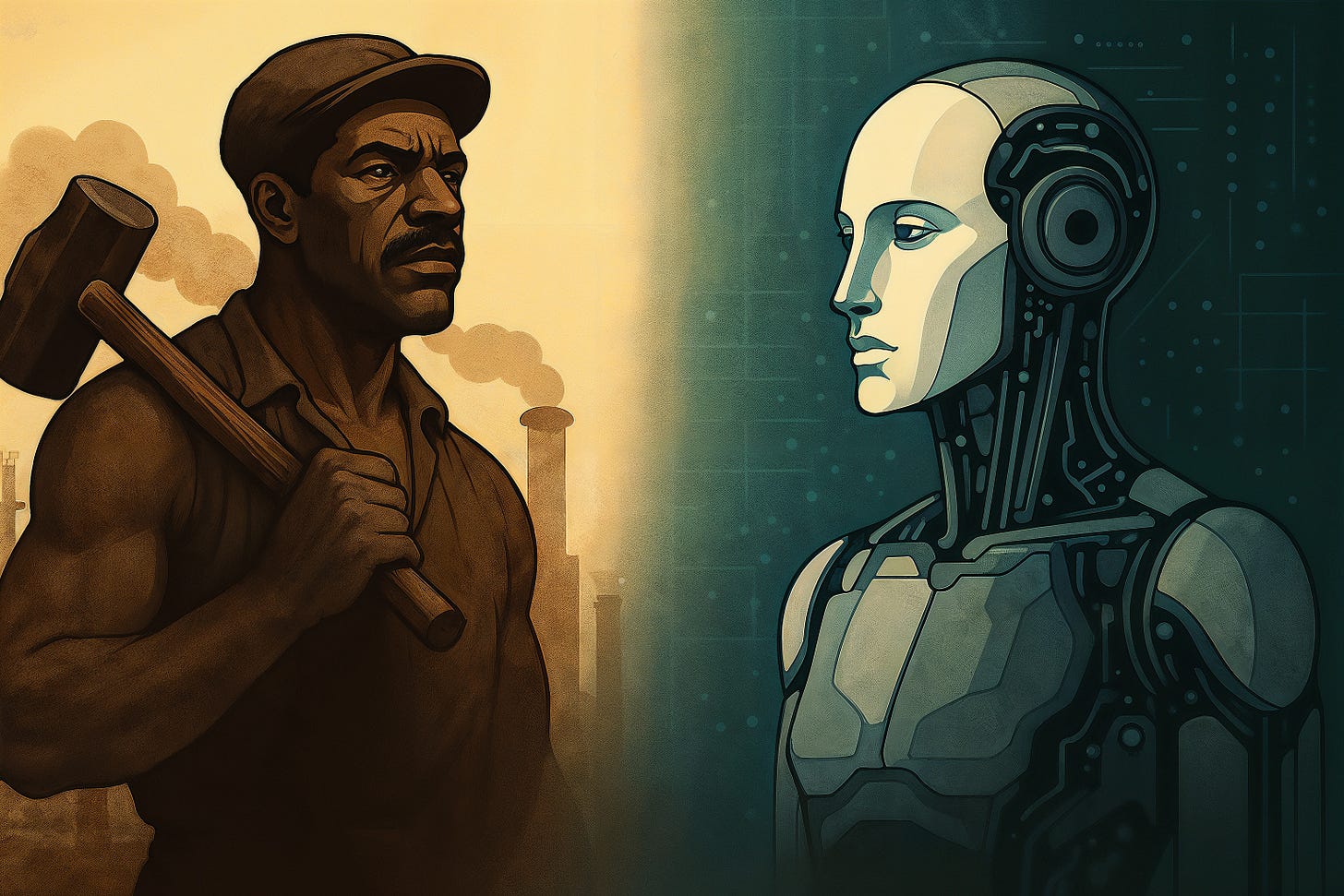Rubicon'd
The legend of John Henry foretells mankind's dwindling economic utility against automation. Then, it was a steam-powered drill decimating the value of human strength. The story ends with Mr. Henry eeking out a momentary victory against the new technology, but then immediately dropping dead, hammer in hand.
The tale symbolizes an era’s end: the industrial revolution steamrolled human Strength and Dexterity as primary labor skills. Machines outpaced muscle - never needing rest.
Now, in the age of artificial intelligence, we face a new upheaval.
The steam engine retired John Henry’s hammer. Now we have Einstein in a box! A machine rivaling (quite frequently surpassing) human Intelligence…
So, what do we expect from generative AI? And what should we now expect from ourselves and each other?
There is no going back to how things were. The very definition of “productivity” is changing before our eyes.
Progress has never been a linear path, and productivity isn’t a linear metric. Doubling the speed of work doesn’t simply double the value created. Speed often ignores destination. If you rush in the wrong direction, you just get lost faster.
Throughout history, each technological leap hasn’t just accelerated work – it has altered the destination.
What a lone human creates in isolation will inevitably mutate via committee when exposed to more minds (or machines). We see this in co-creation with AI: the outcome of a human working with an AI assistant is fundamentally different from what the human alone would have made.
Each person’s interaction with AI is unique (almost fractal in its variability) and many traditional corporate structures struggle to comprehend or capitalize on these decentralized, unpredictable workflows.
Fun fact: over half of employees using AI at work have zero training on its risks or proper use, which shows just how unprepared most organizations are to guide this new reality.
Historically, when machines took over human effort, we adapted by moving up the skill ladder. Raw strength became less valuable when steam shovels and assembly lines arrived. Fine dexterity in handiwork yielded to mechanized precision.
Society shifted focus to cognitive skills – knowledge, analysis, intelligence. But now AI is besting us on those very skills.
The hard truth is that knowing things isn’t the prized skill it used to be, not when a machine can know virtually everything.
As one student aptly noted, today’s AI systems “can access and spit back large swaths of information better than any person.” An AI like ChatGPT can pass standardized exams and regurgitate facts with superhuman efficiency. This means what we typically consider “intelligence” - memorization, rapid recall, routine problem-solving - is no longer a unique human advantage.
Using the Dungeons & Dragons character sheet as a rubric for employment in the modern economy, we’ve seen Strength, Dexterity, and now Intelligence get effectively outsourced to machines. Wisdom then evaporates in a cloud of RAG (Retrieval Augmented Generation), reasoning, and synthesized insights.
So, what’s left for humans?
Our economic utility and marketable skills might boil down to Constitution and Charisma – in other words, our resilience, creativity, adaptability, empathy, and the distinctly human ability to inspire and connect.
It turns out those “soft” skills are now the hard currency in humanity’s continued employment.
The jobs AI can’t easily replace are the ones that demand problem-solving, critical thinking, complex communication, creativity, and emotional intelligence - all traits that fall under human charisma and ingenuity.
We must play to these strengths.
The Power of Questions (Our New Superpower)
If having knowledge is no longer a marketable skill, the new superpower is asking the right questions.
Framing problems, probing for insight, and steering AI - these are becoming more important than memorizing any formula or fact. In a way, prompting is the new programming.
Sadly, the traditional American school system hasn’t exactly trained us for this.
For decades, education emphasized rote memorization and regurgitation of facts - habits that make students act “like robots” doing routine tasks, which actual robots (AI) now do better.
Instead of punishing AI usage, one current student argues, educators should require “more creativity and critical thought – the aspects that separate people from robots.” In other words, curiosity, imagination, and critical inquiry need to move from the margins to the center of our curricula and our workplaces.
It’s ironic: we spent years valuing people for having answers, but now success may hinge on who can ask the more insightful question.
The ability to brainstorm, to pose an off-the-wall idea, to challenge the default - those are inherently human talents that AI, for all its prowess, doesn’t truly possess.
AI can output an answer in five seconds, but figuring out which question to ask in the first place remains an art. Our teachers, bosses, and leaders should start nurturing this skill of inquiry.
After all, an AI is only as good as the prompt it’s given. The future belongs to those who can collaborate with AI, not just consume its answers. And collaboration starts with asking, exploring, and venturing beyond the obvious.
Co-Creation Over Control
To co-create with AI effectively, we’ll need to drop the obsession with micromanagement and rigid control.
Aiming for ultra-focused, predetermined outcomes will often be a struggle. And it’s likely not the worker’s fault when the bullseye is missed. It might be the fault of management’s rigidity and lack of imagination in defining success.
Granular insistence on conformity through every step of a task (that maligned tradition of micro-management) is likely to be the first casualty of rapid AI adoption. And let’s be honest - who will truly miss that?
Evidence is already bearing this out: in a recent experiment, around 90% of participants improved their performance on a creative task by using generative AI, and those who saw the best improvements were the ones who didn’t try to over-edit or control the AI’s output.
In contrast, those who clung to a preconceived idea or tried to force the AI into a narrow box gained less.
The lesson? Give AI room to contribute.
Don’t treat it like a dumb tool that must be tightly reined in. Co-creation means letting go of a bit of control and trusting a process of give-and-take.
This is a mindset shift for many managers.
For generations, management has been about enforcing consistency and minimizing variance. But it is folly to hire individuals to think and create, and then expect zero variance in outcome.
With AI in the mix, variance isn’t just a possibility - it’s a guarantee.
Ten different employees with the same AI tool might solve a problem in ten delightfully different ways. The smartest companies will embrace that diversity of outcomes rather than fear it.
The role of leadership shifts from directing every move to orchestrating an environment where human-AI teams can experiment, iterate, and surprise you with solutions you hadn’t imagined.
Yes, this requires a leap of faith. Things will break. Not every AI-generated idea will be a good one (or even a coherent one). There will be mistakes and weird tangents. But trying to preemptively eliminate all uncertainty will also eliminate the biggest benefits of AI.
A rigid organization with edicts for every comma placement will simply smother the creative potential of its human+AI collaborators. In the new era, acceptance and adaptability are the secret sauce.
In fact, business experts note that adopting generative AI is such a massive change that leaders must help people use the tech “in the right way, for the right tasks” and then “continually adjust and adapt” as the technology evolves.
In other words, continuous learning and flexibility aren’t just feel-good slogans - they’re now requirements for survival.
Companies that empower their teams to iteratively learn with AI will leap ahead. Those that cling to old command-and-control habits will watch opportunities pass them by at lightspeed.
Embrace the New Journey
So, no, we will not be returning to how things were. Not back to the old industrial workflows - not even to last year’s way of doing things.
There’s no returning to a world where human workers could coast on repetitive tasks or cookie-cutter job descriptions.
AI isn’t a temporary fad or just another productivity tool. It’s a whole new collaborator on the team, one that changes the very nature of our expected destination.
Where we’re going is new, different, and altogether unique. Uncharted territory.
Each of us is now primed for our own unique journey with these intelligent machines. The smartest businesses will embrace this, will nurture and accelerate the awakening of human potential that happens when employees are free to co-create with AI.
This is a rallying cry to embrace co-creation.
We should cheer the end of the mindless production-line mentality and welcome a future where imagination and adaptability rule. It’s time to re-imagine job roles, expectations, and outcomes with a spirit of curiosity.
Rather than fearing an AI “takeover,” think of it as an invitation to rediscover what makes human work meaningful. We have the chance to redesign work itself to be more engaging, letting machines handle the drudgery while we focus on insight, strategy, and connection.
Remember, the heroes of tomorrow aren’t those who can memorize the most facts or crank out the most widgets - AI has that covered.
The heroes will be those who can chart a new path, ask the questions no one else thought to ask, and unite teams (human and machine) toward creative goals.
So ask yourself (and ask your AI): what can we discover today that wasn’t possible yesterday? In a world where “knowing things” is cheap, the value lies in vision, judgment, and yes, charisma.
There is no return to the old normal, and that’s okay. We’re forging a new normal as we speak. Forward is the only available direction now.
Embrace the detours and unexpected outcomes along the way.
In this unprecedented journey of human and AI co-evolution, we are all adventurers. And the traits every adventurer needs in abundance is the Constitution to keep going and the Charisma to inspire others to join.
The road ahead is uncertain and exciting, and it belongs to those who are ready to create, not those who cling to the past. Onward, there is no looking back.
—
This piece was drafted by the author with generative assistance from OpenAI’s ChatGPT.
Link to conversation: https://chatgpt.com/share/68619509-0244-8007-8cbf-d80778b3282b










